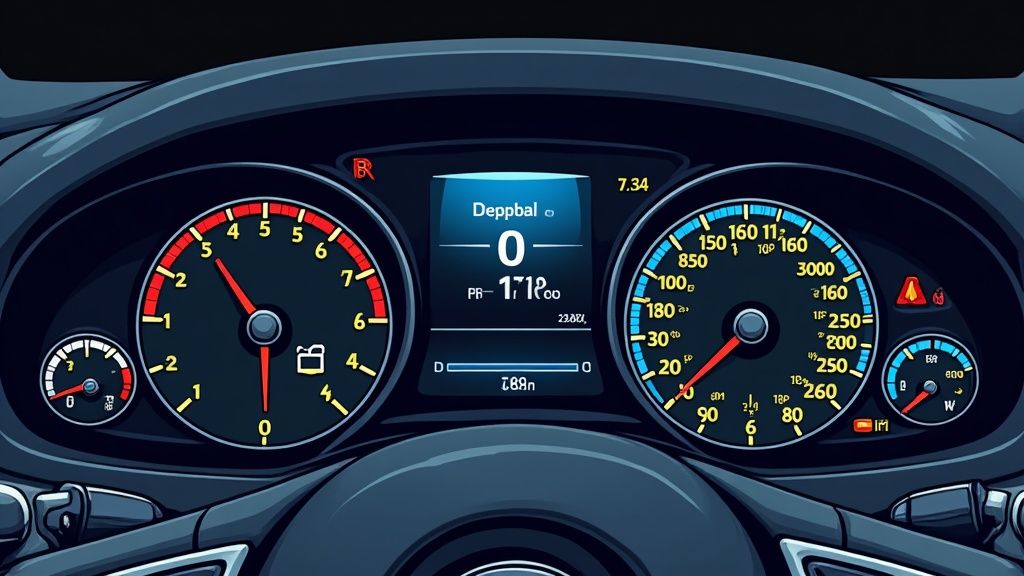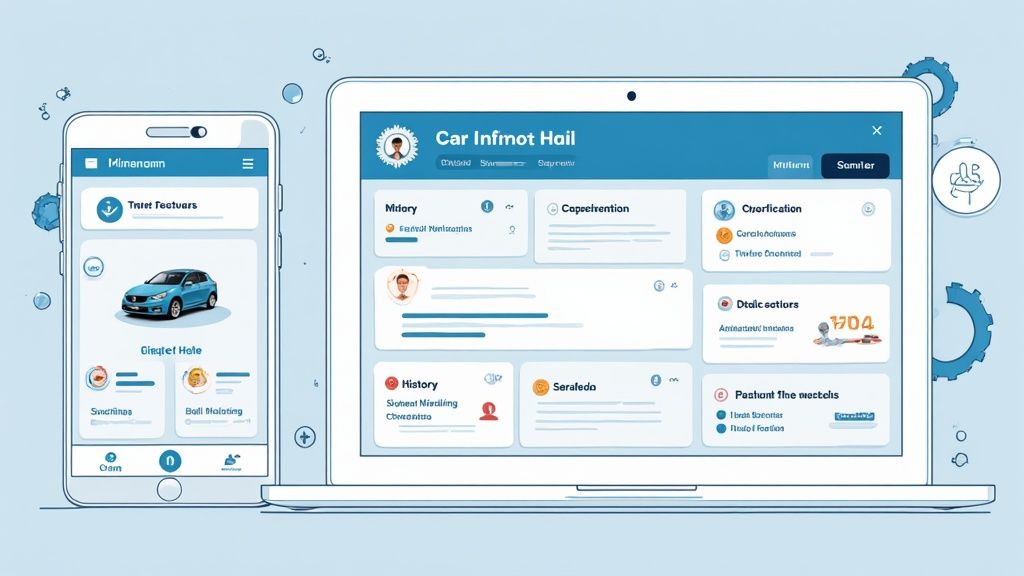
Car Maintenance Tracking: The Ultimate Guide to Vehicle Health and Performance
Understanding The Hidden Impact of Strategic Maintenance Tracking

When you skip regular car maintenance, the effects go far beyond just engine performance. Poor maintenance directly impacts your safety, budget, and environmental footprint. For example, worn brake pads dramatically reduce stopping power, creating serious safety risks. What starts as a minor maintenance skip can quickly develop into major mechanical issues.
The True Cost of Delayed Maintenance
Many car owners don’t realize how expensive postponing maintenance can become. Skipping basic services like oil changes and tire rotations leads to excessive wear on vital components like engines and transmissions. These repairs often cost thousands of dollars - far more than the routine maintenance that could have prevented them. Plus, poorly maintained vehicles burn more fuel, hitting your wallet even harder at the pump.
Recent research from FinanceBuzz reveals concerning trends: 64% of drivers currently delay some form of maintenance. This includes critical services like oil changes (28%), new tires (17%), and check engine light repairs (17%). Nearly half (46%) admit their repair costs could have been avoided with regular maintenance, while 58% say they couldn’t afford an emergency repair over $1,000.
The Benefits of Proactive Car Maintenance Tracking
At its core, car maintenance tracking is about smart vehicle management. Like preventive healthcare for your body, consistent maintenance prevents serious problems before they start. Regular tracking helps you catch small issues early, before they become expensive emergencies.
How Tracking Transforms Your Ownership Experience
Good maintenance records give you control over your vehicle’s health. By documenting each service, you can spot patterns and plan for upcoming maintenance needs. This helps you budget effectively and avoid surprise repair bills. Plus, detailed service records significantly boost your car’s resale value by showing potential buyers that you’ve taken good care of the vehicle.
Real-World Success with Car Maintenance Tracking
Smart car owners know that tracking maintenance saves money and stress. They focus on addressing small problems promptly to prevent major failures. Take tire rotation - this simple service extends tire life and improves fuel economy when done regularly. Using tools like Auto Service Logger makes it easy to maintain digital records and stay on top of service schedules. Through consistent maintenance tracking, you protect your investment and ensure reliable transportation for years to come.
Building Your Personal Maintenance Tracking System

A well-organized car maintenance tracking system is essential for keeping your vehicle in top shape. Relying just on memory for service schedules is risky - missing key maintenance can lead to expensive repairs later. Having a proper system in place helps you stay on top of your car’s needs.
Combining Digital and Physical Tracking
The most effective approach combines modern apps with traditional paper records for complete coverage:
- Digital Tools: Apps like Auto Service Logger help track mileage, set maintenance reminders, and log expenses in one central place. These tools make it easy to monitor your car’s maintenance history.
- Paper Records: Keep physical copies of service receipts, warranty documents and repair records as a backup. Like a spare tire, paper records provide security if digital records become inaccessible.
Establishing a Routine and Setting Reminders
Regular maintenance checks help prevent issues before they become serious problems:
- Schedule Important Services: Use your tracking tools to set reminders for routine tasks like oil changes, tire rotations, and filter replacements. This helps you handle maintenance proactively.
- Regular Inspections: Take time each month to check tire pressure, fluid levels, and look for any visible issues. These quick checks often catch problems early.
Organizing and Leveraging Your Data
Good record-keeping helps you make smart decisions about your car’s care:
- Service History: Maintain detailed records of all repairs and maintenance. This documentation is valuable for warranty claims and can increase resale value by showing proper care. A complete history also helps identify recurring issues.
- Cost Analysis: Track your maintenance expenses to budget effectively. Compare service provider prices and identify which tasks you can handle yourself. Research shows that 7.9% of owners delay routine maintenance due to costs. Learn more about maintenance delay statistics.
Follow these guidelines to create a practical maintenance tracking system that keeps your vehicle running reliably for years to come.
Mastering Maintenance Intervals Across Vehicle Types

Every vehicle has specific maintenance needs that match its design and usage patterns. A standardized approach to maintenance tracking won’t work effectively across different vehicle types. Understanding the right service timing for your specific vehicle helps extend its life and keeps it running smoothly.
Economy vs. Luxury: Different Service Needs
Basic economy cars typically need simpler maintenance routines. Most recommend oil changes every 7,500 miles or 6 months. In contrast, luxury vehicles often have more complex systems and turbo engines that need more frequent care - some requiring oil changes as often as every 5,000 miles. Keeping track of these differences helps prevent costly issues.
Make and Model Matter
Service schedules vary even between similar vehicles. For example, a Honda Civic’s maintenance timing differs from a Toyota Corolla’s, though both are economy cars. Your owner’s manual lists the exact service schedule for your vehicle. Car repair timing also changes based on the vehicle’s age and past maintenance. For detailed repair statistics, check out Car Talk Repair Statistics.
Driving Conditions and Their Impact
Your driving environment affects how often your car needs service. City driving with frequent stops puts more strain on brakes and transmission than highway cruising. Extreme temperatures and off-road use also increase maintenance needs. Good maintenance tracking accounts for these real-world factors.
Tracking Multiple Vehicles: Staying Organized
Managing maintenance for several vehicles can be challenging since each has different needs. Digital tools like Auto Service Logger help track multiple vehicles in one place. You can set custom reminders and keep service records organized. This helps ensure each vehicle gets proper care at the right time, leading to safer driving and lower costs over time.
Strategic Choices: DIY Tracking vs. Professional Service Management

When it comes to maintaining your vehicle, you have two main options - tracking maintenance yourself or having professionals manage it. Each approach has its unique benefits that suit different needs, preferences, and budgets.
DIY Car Maintenance Tracking: Taking Control of Your Vehicle’s Health
Managing your own car maintenance puts you in direct control. You can track mileage, schedule services, and keep detailed records using simple tools like spreadsheets, notebooks, or specialized apps like Auto Service Logger. This hands-on approach lets you customize tracking based on your specific vehicle and how you use it.
Benefits of DIY Tracking
- Cost Savings: Basic maintenance tasks like checking tire pressure, fluid levels, and changing air filters can be done at home, reducing labor costs
- Better Understanding: Working on your car helps you learn how it functions and spot potential issues early
- Schedule Freedom: You choose when and how to perform maintenance, ideal for busy schedules or limited access to shops
Professional Service Management: Expertise and Convenience
Having professionals handle your car maintenance gives you access to expert mechanics and specialized equipment. This becomes especially important for complex repairs that require advanced diagnostic tools and technical knowledge. Professional service records also help maintain warranties and boost resale value.
Benefits of Professional Service Management
- Expert Care: Trained mechanics can efficiently diagnose and fix complex issues while avoiding potential mistakes
- Time Efficiency: You save time by letting professionals handle maintenance tasks instead of doing them yourself
- Documentation: Complete service records from reputable shops protect your warranty and show future buyers the car was well-maintained
Finding the Right Balance
Many car owners get the best results by combining both approaches. They handle simple tasks themselves while relying on professionals for complex repairs. This mix offers both cost savings and expert care when needed.
For more insights into car maintenance patterns, check out the Continuing Consumer Automotive Maintenance Survey (CCAMS). This study tracks over 175 parts and services across areas like braking, electrical systems, and routine maintenance. Whether you choose DIY, professional help, or both, consistent maintenance tracking keeps your vehicle running well and holds its value.
Smart Tools for Better Car Maintenance Management
Modern tools make tracking car maintenance significantly easier and more efficient. From basic mobile apps to advanced vehicle monitoring systems, the right solution helps prevent unexpected breakdowns and gives you better control over maintenance costs.
Finding Your Perfect Maintenance Tool
The most suitable tool depends on what you want to accomplish. A straightforward phone app might work well if you just need service reminders. For example, Auto Service Logger lets you track mileage, set maintenance alerts, and record expenses. For more detailed monitoring of your car’s health, consider a telematics system.
What Telematics Can Do
Think of telematics as a continuous health monitor for your vehicle. It combines GPS with onboard diagnostics (OBD) to track performance in real-time. A small device connects to your car’s OBD port to gather data on speed, location, fuel use, and engine status. This information gets sent wirelessly to software where you can review and analyze it.
Key Advantages of Telematics for Maintenance
Telematics offers several important benefits:
- Spots Problems Early: By watching data patterns, telematics can identify potential issues before they become serious repairs
- Remote Check-ups: See what’s wrong without visiting a mechanic first
- Better Fuel Use: Track driving patterns to improve fuel economy
- Safer Driving: Features like speed monitoring help promote safer habits
Using Multiple Tools Together
Many car owners combine different tracking methods effectively. You might use a maintenance app, telematics system, and paper records together. For example, track overall costs in a spreadsheet while using an app for service alerts and telematics for detailed performance data.
Making Sense of Your Data
Good data management is key when tracking maintenance. Cloud storage lets you access records securely from anywhere. Look for tools with clear reporting features to help spot trends and make smart decisions about your car’s care. This helps optimize your maintenance timing and can extend your vehicle’s lifespan.
Stop Problems Before They Start
Using technology for maintenance tracking helps you move from fixing problems to preventing them. Rather than waiting for breakdowns, you can address small issues early before they lead to expensive repairs. This approach saves money and gives you confidence that your car is well-maintained.
Developing Your Long-Term Maintenance Success Strategy
Keeping your vehicle running smoothly requires more than just recording oil changes - it needs a clear plan that grows with your car’s needs over time. A well-structured maintenance system helps you make smart decisions about your car’s care, protect its value, and manage ownership costs effectively.
Budgeting for Future Maintenance: Planning Ahead for Big Expenses
Regular maintenance tracking gives you better insight into future costs. By monitoring your current expenses and understanding what your specific vehicle requires, you can make more precise cost projections. Setting aside small amounts each month helps avoid the financial strain of major unexpected repairs. This systematic approach to budgeting works much like a savings plan - small, regular contributions add up significantly over time.
Maintaining Detailed Service Histories: Increasing Resale Value
A complete service record becomes a valuable asset when selling or trading in your vehicle. This documentation proves to potential buyers that the car received proper care throughout its life. Similar to a well-documented home history, detailed maintenance records build buyer confidence and can support a higher sale price. You might be interested in: How to master car maintenance tracking with our sitemap.
Adapting Your Tracking System: Making Use of New Tools
Modern car maintenance tracking offers more options than ever before. Today’s apps, vehicle monitoring systems, and digital platforms provide detailed insights into your car’s health and potential issues. By staying informed about these tools and adding useful ones to your tracking system, you’ll get better data about your vehicle. For instance, connecting a monitoring device with your tracking app can show real-time engine data and flag problems early.
Measuring the Effectiveness of Your Strategy: Making Informed Choices
Regular tracking creates a valuable data set about your car’s performance and maintenance needs. This information reveals patterns that help you optimize service timing and make smarter decisions about car care. With solid data, you can address issues early and invest wisely in maintenance to extend your vehicle’s life while keeping costs down. For example, if your records show steadily increasing fuel use, it might point to needed engine maintenance.
Ready to improve your car maintenance tracking? Auto Service Logger offers a complete system to record, store, and review your vehicle’s maintenance history, helping you make better decisions about your car’s care. Visit Auto Service Logger today to start building your maintenance strategy.